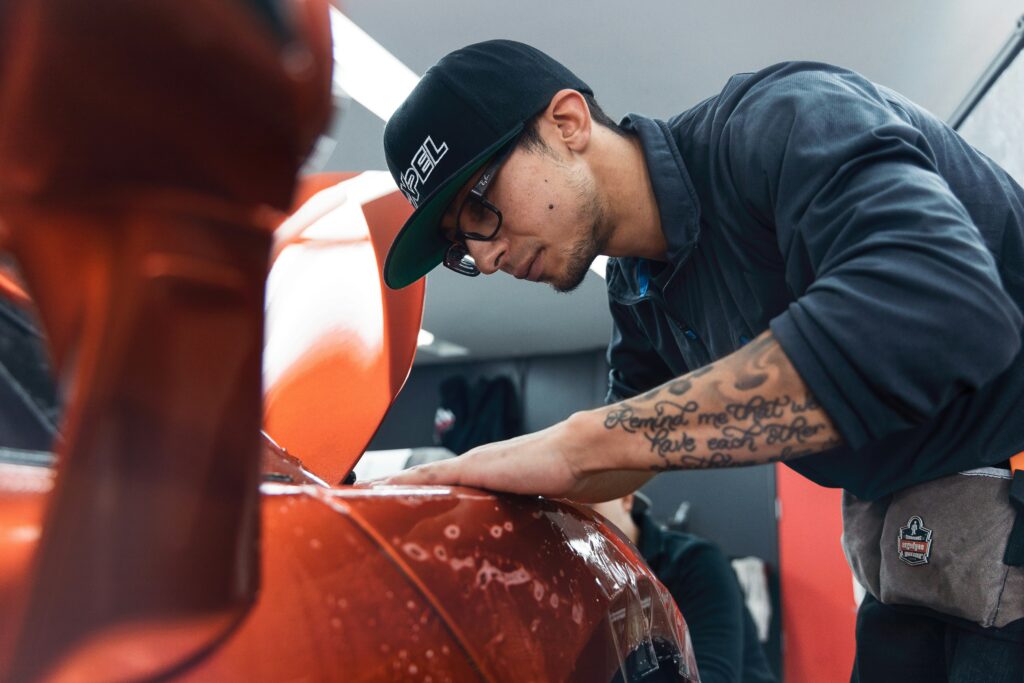Your car is one of your most significant investments, and maintaining its value is essential, especially if you live in New Jersey. The harsh weather, busy roads, and environmental elements can affect your vehicle’s exterior. One highly effective solution to protect your car’s paint and retain its value is Paint Protection Film (PPF). Let’s dive into how PPF can be the ultimate shield for your vehicle in the Garden State.

Contents of the Article
What Is Paint Protection Film (PPF)?
Paint Protection Film, often referred to as PPF, is a transparent layer of urethane applied to a car’s exterior surfaces. Originally used in military applications, it’s now widely available to protect cars from common environmental and physical damage. PPF comes in various forms, including gloss, matte, and even self-healing options that restore themselves when minor scratches occur.
How Paint Protection Film Works
The science behind PPF is fascinating. It acts as a barrier between your car’s paint and external hazards such as debris, road salt, and weather elements. This film absorbs the impact of small objects and reduces the risk of scratches or damage, leaving the original paint beneath it untouched.
Benefits of Paint Protection Film for Your Car
Shield Against Environmental Factors
In New Jersey, your car faces a myriad of environmental challenges. Whether it’s tree sap, bird droppings, or acid rain, PPF serves as a protective layer that prevents these substances from damaging the car’s paint.
Protection from Physical Damage
From stones kicked up on highways to unexpected shopping cart bumps, physical damage is inevitable. PPF reduces the likelihood of chips, scratches, and dents, ensuring your car stays in pristine condition.
UV Radiation Protection
Prolonged exposure to sunlight can cause paint to fade and deteriorate over time. PPF blocks harmful UV rays, maintaining your car’s shine and original color for longer.
Why Paint Protection Is Important in New Jersey
Harsh Weather Conditions
New Jersey’s weather can be unpredictable, with heavy snow, rain, and scorching summers. All these elements can wear down your car’s paint. PPF acts as a defense layer, preventing the elements from degrading the exterior.
Road Salt and Debris
During winter, road salt is commonly used in New Jersey to melt ice. While effective for road safety, salt can corrode a car’s paint and cause rust. PPF provides a safeguard, preventing salt from damaging your vehicle.
Urban Driving and Traffic Risks
Driving in urban areas or through crowded streets can increase the risk of minor accidents or scratches. PPF offers peace of mind by acting as a buffer against incidental damage from traffic.
How Paint Protection Film Preserves Your Car’s Value
Maintains Original Paint Quality
The better the paint on your car, the higher its resale value. PPF helps maintain the factory-fresh look of your car by protecting the paint from damage and fading.
Prevents Minor Scratches and Dents
Even minor blemishes can decrease your car’s value over time. By applying PPF, you prevent these small imperfections from diminishing your vehicle’s appeal.
Long-term ROI for Car Owners
Though the initial cost of PPF might seem high, it pays off in the long run by reducing the need for touch-up paint jobs and other repairs. This results in a higher resale value when it’s time to sell or trade-in your car.
Does Paint Protection Film Affect Car Aesthetics?
Invisible Protection
One of the biggest advantages of PPF is that it’s practically invisible. You can keep your car looking its best without altering its appearance.
Matte vs. Gloss Finishes
PPF comes in both matte and gloss finishes, allowing car owners to choose the look that complements their vehicle. Whether you want to enhance a sleek, modern appearance or keep the original finish, PPF adapts to your style.
Self-Healing Capabilities
Many high-end PPF products have self-healing properties. Minor scratches on the film can vanish with exposure to heat, leaving your car looking flawless.
Common Myths About Paint Protection Film
Myth: PPF is Too Expensive
While PPF may seem like an upfront investment, it’s cost-effective in the long run. It prevents costly repairs and maintains your car’s resale value.
Myth: PPF Damages the Paint
Quite the opposite! PPF is designed to protect your car’s paint and can be removed without damaging the underlying surface.
Myth: PPF is Unnecessary with Modern Car Paints
While modern car paints are durable, they’re not immune to damage. PPF adds an extra layer of security, ensuring that even the toughest paint jobs last longer.
How to Choose the Right Paint Protection Film in New Jersey
Factors to Consider
When selecting a PPF, consider factors like thickness, durability, and warranty options. High-quality films offer better protection and longer life.
Trusted Brands and Providers in New Jersey
Look for reputable installers and brands in New Jersey that offer guarantees and quality installations. Local providers understand the unique challenges of the area’s environment.
Warranty and Aftercare
Many PPF products come with warranties, providing additional peace of mind. Ensure that you follow aftercare instructions to keep the film in top condition.
Installation Process for Paint Protection Film
Professional Installation vs. DIY
While some DIY kits are available, it’s best to opt for professional installation. This ensures the film is applied without bubbles or imperfections.
Time and Cost Involved
Installation typically takes a few hours, depending on the car’s size and the areas covered. Costs vary but usually range between $500 and $5,000, depending on the level of protection desired.